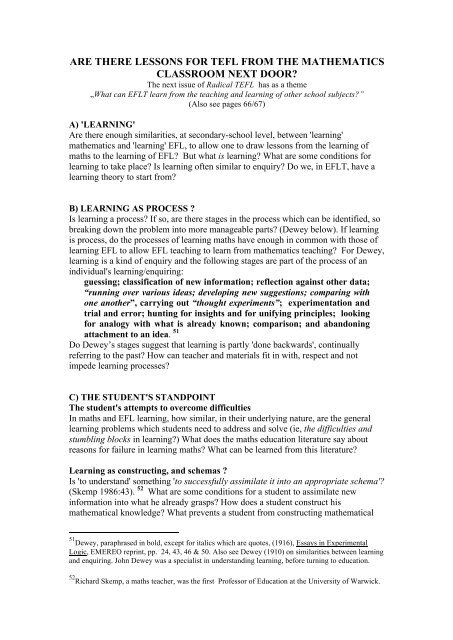RADICAL TEFL
2hqhXJd
2hqhXJd
Create successful ePaper yourself
Turn your PDF publications into a flip-book with our unique Google optimized e-Paper software.
ARE THERE LESSONS FOR <strong>TEFL</strong> FROM THE MATHEMATICS<br />
CLASSROOM NEXT DOOR?<br />
The next issue of Radical <strong>TEFL</strong> has as a theme<br />
„What can EFLT learn from the teaching and learning of other school subjects?”<br />
(Also see pages 66/67)<br />
A) 'LEARNING'<br />
Are there enough similarities, at secondary-school level, between 'learning'<br />
mathematics and 'learning' EFL, to allow one to draw lessons from the learning of<br />
maths to the learning of EFL? But what is learning? What are some conditions for<br />
learning to take place? Is learning often similar to enquiry? Do we, in EFLT, have a<br />
learning theory to start from?<br />
B) LEARNING AS PROCESS ?<br />
Is learning a process? If so, are there stages in the process which can be identified, so<br />
breaking down the problem into more manageable parts? (Dewey below). If learning<br />
is process, do the processes of learning maths have enough in common with those of<br />
learning EFL to allow EFL teaching to learn from mathematics teaching? For Dewey,<br />
learning is a kind of enquiry and the following stages are part of the process of an<br />
individual's learning/enquiring:<br />
guessing; classification of new information; reflection against other data;<br />
“running over various ideas; developing new suggestions; comparing with<br />
one another”, carrying out “thought experiments”; experimentation and<br />
trial and error; hunting for insights and for unifying principles; looking<br />
for analogy with what is already known; comparison; and abandoning<br />
attachment to an idea. 51<br />
Do Dewey’s stages suggest that learning is partly 'done backwards', continually<br />
referring to the past? How can teacher and materials fit in with, respect and not<br />
impede learning processes?<br />
C) THE STUDENT'S STANDPOINT<br />
The student's attempts to overcome difficulties<br />
In maths and EFL learning, how similar, in their underlying nature, are the general<br />
learning problems which students need to address and solve (ie, the difficulties and<br />
stumbling blocks in learning?) What does the maths education literature say about<br />
reasons for failure in learning maths? What can be learned from this literature?<br />
Learning as constructing, and schemas ?<br />
Is 'to understand' something 'to successfully assimilate it into an appropriate schema'?<br />
(Skemp 1986:43). 52 What are some conditions for a student to assimilate new<br />
information into what he already grasps? How does a student construct his<br />
mathematical knowledge? What prevents a student from constructing mathematical<br />
51 Dewey, paraphrased in bold, except for italics which are quotes, (1916), Essays in Experimental<br />
Logic, EMEREO reprint, pp. 24, 43, 46 & 50. Also see Dewey (1910) on similarities between learning<br />
and enquiring. John Dewey was a specialist in understanding learning, before turning to education.<br />
52 Richard Skemp, a maths teacher, was the first Professor of Education at the University of Warwick.


